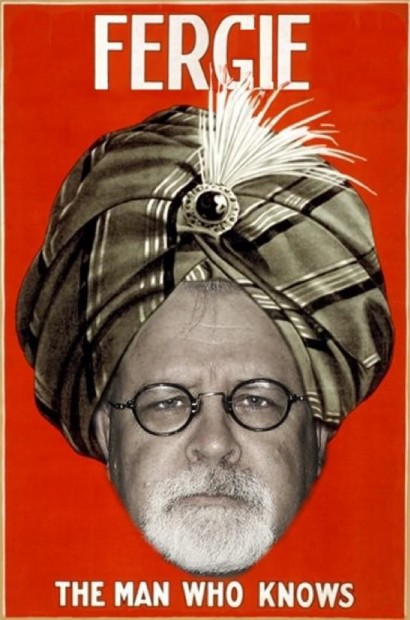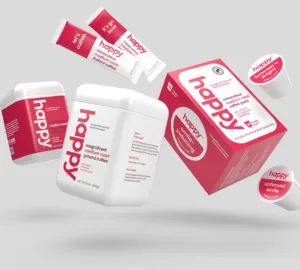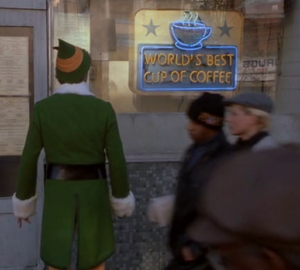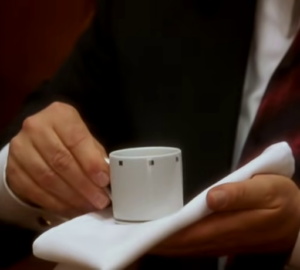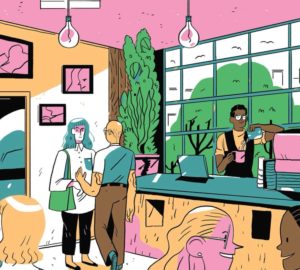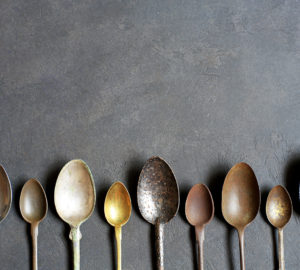Right now – at this very moment, while we edit the feature you’re about to read – specialty coffee’s longest running charitable organization, Coffee Kids, is celebrating its 25th Anniversary as part of the SCAA Event Welcome Reception.
We’ve long admired and respected Coffee Kids, but their story isn’t particularly conducive to sound bites. They’re a non-governmental organization that work tirelessly around the world, with a wide variety of partner organizations, to develop longterm projects that directly better the lives of coffee farmers and their families. It’s hard to talk about what they do without simplifying the narrative, or falling back on platitudes, but we can tell you that many of the folks in this industry whom we most respect are closely aligned with Coffee Kids, and have championed their mission for decades.
One such person is Mike Ferguson, Business Development Director at Batdorf & Bronson. We’ve worked with Mr. Ferguson for several years; B&B is a long-standing partner of this website, and their support of Sprudge is an important part of why our project continues to grow. He’s been involved with Coffee Kids since the late 9o’s, and has served as a member of the Coffee Kids board for the last 3 years. He is today the organization’s president.
We reached out to Mike in advance of tonight’s 25th anniversary celebration for a thoughtful, candid set of 5 questions.
How did you first get involved with Coffee Kids? What year was it? What was the organization like then?
“I learned of Coffee Kids shortly after joining the staff of SCAA in 1998. My wife Jennifer and I became supporters personally and in my role at SCAA I had the opportunity to help expand the association’s institutional support. Jen helped them with some event planning as a volunteer over the years. In 2008 I volunteered to assist them with strategic planning and in 2010 I was invited to be a part of the board.
While I understood the Coffee Kids mission from the start, I think it’s important to note, perhaps confess, that I did not really begin to understand how Coffee Kids worked, in specifics, until I helped them with strategic planning in 2008. I mention this because I think most people who support Coffee Kids will admit the same thing. They grasp the mission, help coffee farming families and communities, and that’s enough to write a check. That’s good news and bad news. We appreciate and need the support, but when people really come to understand how we accomplish our mission, they are likely to not only increase their support but become advocates. Advocates create more supporters.
In that respect, the organization has not changed. Quality of life issues at origin are complex and Coffee Kids has always been willing to tackle complex challenges that don’t sound bite easily. Coffee Kids has expanded its areas of focus over the years but it remains much as it was, committed to addressing needs that are defined by the community with solutions defined by the community. Coffee Kids was local before local was cool.”
Talk to us about some of the big successes in the last 25 years of Coffee Kids. What moments stand out to you? What are you the most proud of?
“In recent years, I am very proud of the organization for surviving the recession. We all know that giving is among the things company’s cut back on when the economy takes a down turn. The recession hit Coffee Kids extremely hard. We were fortunate to have prudent reserves but once we had gone through those we had to scramble, make some difficult decisions, and brings in new revenue.
In general terms, I am proud of Coffee Kids for chasing the mission and not the money. There are always sources of more funding if you are willing to reshape your purpose to fit that money, or make changes to your methodology. Coffee Kids is not gringo-forward. We are not sitting up north deciding what coffee growing communities need. We listen to the communities and let them tell us what is needed. There is always someone willing to fund what they think is needed, usually something that will look good next to their name. Coffee Kids has remained true to its methodology.”
You’ve at times been critical of “not doing enough” with Coffee Kids – your now-famous “Looking Back” feature from a few months ago, for starters. Talk to us about that a little bit – what more do you want the project to accomplish? What have been your biggest frustrations?
“You have to understand that this criticism is leveled first at myself for not doing enough to advocate for Coffee Kids. Look, it takes time to explain what Coffee Kids does. You have to look people in the eye, ask them to slow down, listen and think. Coffee Kids has always been a conversation, not a slogan. It’s tough to “Twitterfy” Coffee Kids. In my experience, people who stand at decision points relative to financial commitments want to grasp the value quickly and too often, people like me are not willing to get a firm grip on their elbow and say, “No, this is
going to take a few minutes, Mr. CEO. The people who grow the coffee you drink or roast or sell or manufacturer equipment to brew are starving six months out of the year and the solutions don’t sound bite.”
We continually struggle with writing a simple explanation, an “elevator speech” for Coffee Kids, and that is an important process, as long as we stop short of apologizing for the fact that you don’t really know what Coffee Kids does and I can’t really explain it to you standing here in the elevator. So, that is my criticism of myself and other advocates, we keep bowing to the pressure to dumb-down Coffee Kids and it bites us.
An example of this illustrates my criticism of the industry. There is a company that was not only a long-time supporter of Coffee Kids, but was making a very significant financial commitment. In large part, this was driven by someone on their staff who took the time to really understand how Coffee Kids worked and what we really accomplished. He dug in and then got really excited. He got it and became an advocate within his company and convinced them to increase their funding several times over. Then, as happens, he moved on to another company in another industry and a couple of accounting squibs took over the Coffee Kids relationship. They did not take the time to understand who Coffee Kids was and what we did and slashed the funding.
They didn’t take the time? We could not make our case? Both. As I write this, Sprudge is attending the SCAA Symposium in Boston. The Symposium concept speaks to the fact that complex issues take time to understand. Everything about Coffee Kids, from how we decide to support a project to how we acquire funding, is a conversation and it doesn’t fit on the back of an envelope.
I mean, how do you respond to the topic of coffee rust? Well, first thing you do is sit down, right? Because it’s a conversation. People are just starting to understand that they don’t understand. It’s not going to just be okay. That’s our struggle as advocates for Coffee Kids.”
Like a lot of folks, we’ve kept in tune with Coffee Kids through the advocacy and involvement of some of its prominent supporters – you, for starters, and also Mark Prince, who has been raising money for CK via CoffeeGeek for years. Who are some other prominent supporters? Who makes the project what it is?
“I’m glad you mention Mark Prince. Mark’s original handle online, years ago, was Coffee Kid and he still own coffeekid.com. Very early on he put a re-direct on his home page to send people to Coffee Kids so there was no confusion and this is indicative of Mark’s support over the years. Mark’s impact on Coffee Kids has been exponential because he points people to us. I have no idea how many individual supporters have come to Coffee Kids via Mark Prince and Coffee Geek but I know it is a substantial number. And that’s apart from Mark’s fundraising efforts via
his annual holiday gift list and other efforts.
Taking time to understand Coffee Kids and talk to others about it is valuable too, perhaps more valuable in the long run than a direct individual donation.
A list of our donors can be found of our website here and, you know, it takes a village. They are all important but I have to mention Green Mountain. Green Mountain Coffee Roasters has been, for many years, not only a donor but a partner, advocate, and even a mentor. Green Mountain does a stunning amount of work at origin and really serves as a model in the specialty coffee industry of effective impacts. Their commitment has grown as the company has grown.
Of course SCAA has always been a great supporter and is sharing the stage with us in Boston as they celebrate their 25th conference and we celebrate 25 years.”
What comes next for Coffee Kids? What will the next 25 years look like? And for folks just finding out about the project today, what’s the one thing they should know to get them involved? How can they help?
“Twenty-five years ago Coffee Kids was more or less the only game in town when it came to charities exclusive to the coffee industry. That’s changed, and while this is ultimately a good thing, it can be challenging for individual organizations. As a result, I think you will see an increase in focus from Coffee Kids. We no longer need to cover all the bases like we did when we were the only group out there. That will be a gradual change.
The Coffee Kid methodology is support groups within the local coffee growing communities. We are not the boots on the ground; we support the boots that are already there. One exciting change related to this mirrors a change in the industry’s relationship to origin over the last 25 years. Once upon a time, small farmers had no idea what was happening in the coffee industry. They didn’t understand where their coffee went, its true value, and they didn’t cup coffee, just to name a few examples. All of these things have been changing, especially in the last 10-15 years.
In the same way that small farmers have begun to understand their place in the larger coffee world, the grassroots groups that provide assistance to small farming communities have begun to understand the importance of telling their stories and measuring their impacts. I get very excited by the idea of allowing the stories to speak for themselves.
We have a new website that does a better job than we ever have of talking about Coffee Kids. Everyone should start there, click the Projects tab and visit program on the ground via the website. When you find a project that excites you, and you will, click the share button and let people know about it on Twitter or Facebook. Of course, make a donation, but more importantly, start a conversation.”











